Sky's Stephen van Rooyen talks Wiggins and winning
Sky’s managing director of sales and marketing tells Lucy Handley about how he plans to strengthen the broadcaster’s position as a brand consumers and rivals look up to.
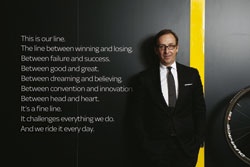
BSkyB is riding high. Last month its Team Sky cyclist Bradley Wiggins rode to victory in the Tour de France and days later it announced annual profits of £1.2bn, up 17 per cent on the previous year.
Despite having to contend with flat advertising figures, slowing subscription rates and a reputation dented by stakeholder News Corp’s involvement in the phone hacking scandal, Sky’s managing director of sales and marketing Stephen van Rooyen - the man behind the brand and its £200m budget - is upbeat.
Meeting him in his glass-walled office, he appears not unlike a modern-day Don Draper, the ad agency star of hit show Mad Men that is now available exclusively on Sky Atlantic.
Dressed in a black suit and tie complete with breast-pocket handkerchief, he says of taking over the role a year ago: “I think this is the best job in Britain. The combination of having the incredible dynamism of the Sky brand, the sub-brands we have, the innovation we deliver, the focus on the customer [meant] I was nothing but upbeat about the size and scale of the opportunity.”
Van Rooyen got the top job in August 2011, after a top-level management reshuffle, which saw his boss Andrea Zappia leave the UK position to become chief executive of Sky Italia. Zappia took on that role in place of Tom Mockridge, who left Sky Italia to run News International in place of Rebekah Brooks, who resigned in the light of the phone hacking scandal.
Since being promoted to the top marketing job, van Rooyen has helped launch Sky’s Formula 1 channel and pay-as-you-go internet service Now TV.
Launched last month, Sky is hoping that Now TV will sweep up those people without a full subscription. It costs £15 a month and currently only offers films, but further content including sport and entertainment will be added between now and early 2013.
The brand is to spend around £30m on launching Now TV and while van Rooyen won’t talk about targets or figures, he claims the service is different to cheaper rivals LoveFilm or Netflix because it offers more recent releases.
“I don’t think it’s expensive at all. What you have to start with is what the relative propositions offer. We already have millions of subscribers for Sky Movies, paying around the same price, so we know there is some value at our price point.
“If you stripped it down and compared how recently the movies were released and the scale of them, we think that comes with a certain sense of quality that you are not able to get with other providers.”
But with Now TV about to add sport and entertainment content, is there a worry that it might cannibalise the core base of Sky subscribers? “We spent a lot of time looking at that question and really considering it,” he says.
“We see it as a complementary service which new customers might be attracted to. We have done the research and looked at existing customers and prospects and are pretty clear that there is a very different type of customer for the two types of proposition.”
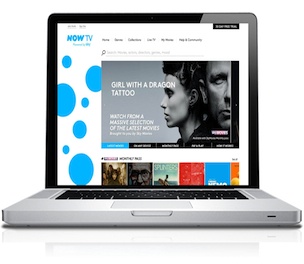
Sky had a target of 10 million subscribers and it now has 10.6 million, however growth is slowing. It only added 312,000 customers this financial year compared with 426,000 in the last one. Advertising revenue is also down 4 per cent year on year.
So Now TV is an important strategic move for the broadcaster. As van Rooyen points out, 45 per cent of people in the UK do not subscribe to Sky, so it is hoping its new internet service will appeal to them.
Like the agency in Mad Men, Sterling Cooper Draper Pryce, Sky has a bit of a reputation for being aggressive, even ruthless. But van Rooyen says that this comparison is unfounded. “It remains the biggest surprise of my career that Sky is sold to be very aggressive. I’ve not found that at all.”
However, it is not afraid to take on other broadcasters that are already doing a good job at something and try to improve on it. One example of this is its new Formula 1 channel, which was established after agreeing to split the F1 rights with the BBC in a reported £150m deal.
The style that pervades all the people at Sky is always this quest for trying to do more, do better than how someone currently does it
“When we looked at F1, the BBC was already doing an incredible job with it, so we thought, how are we going to be even better? The style that pervades all the people at Sky is always this quest for trying to do more, better than how someone currently does it. Sometimes that is confused with being aggressive rather than having a deep belief in doing things much better.”
But Sky’s reputation and that of News Corp, which owns 39 per cent of the broadcaster, have been tarnished by the hacking scandal surrounding sister company News International’s papers The Sun and the News of the World, which was closed because of it. James Murdoch stood down as chairman of Sky in the wake of the scandal in April, but remains an executive director. Meanwhile, regulator Ofcom’s investigation into whether it is fit to broadcast continues.
When announcing Sky’s latest results in July, chief executive Jeremy Darroch said: “We continue to believe that Sky remains a fit and proper licence holder, as demonstrated by our strong record of regulatory compliance and high standards of governance.” Last week, [note 2 August] the Competition Commission said that Sky’s position in the pay tv movie market does not adversely affect competition.
Rupert Murdoch has also resigned from his role as a director of News International (NI), which has fuelled speculation that it might be a precursor to selling off its newspapers, including The Sun and The Times, ahead of the split of News Corp. But van Rooyen won’t speculate on how this might affect Sky’s business, saying only: “I don’t know how News Corp makes decisions around Rupert’s and James’ roles.”
He does call working with the Murdochs a “privilege” although this seems somewhat ironic given the extent of the damage done by the hacking scandal. He adds: “They have made an incredible difference, that is the most important thing that can be measured in your career, whether you can make a positive difference,” he adds.
Links between Sky and the News Corp-owned NI and its newspaper titles The Times and The Sun are relatively loose, he claims. He calls the two companies cousins, rather than sisters, and says the failed bid by News Corp to buy the 61 per cent of Sky that it does not already own has not been a distraction. Neither, he says, has the hacking scandal damaged it as an employer brand (see Q&A, below).
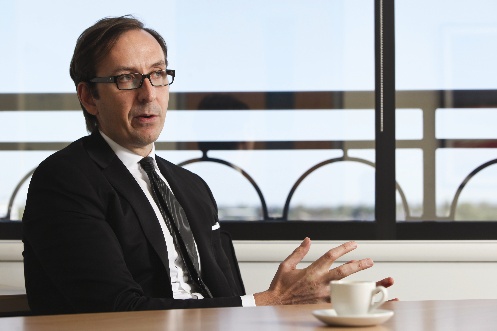
Yet van Rooyen does have personal links to NI, having worked there as director of business development from 1999 for four years, working with current NI chief marketing officer Katie Vanneck-Smith.
“I chat to her, I used to work with her so I know her very well. It is very rarely about work. The challenges the businesses have are very different, the style and required marketing are very different. So mostly we just catch up socially rather than anything formal,” he states.
But NI has easy access to Team Sky cycling coach Dave Brailsford, who gave a talk earlier this year about his training methods to clients of the newspaper group, and Sky was also the first - and possibly the only - brand to be allowed to advertise in The Sun using a cover wrap.
Van Rooyen claims the links between NI and Sky don’t give the broadcaster any advantage when it comes to advertising, rather it is down to agency Mediacom to negotiate and use the broadcaster’s clout as a big spender.
The cover wrap, advertising Sky’s 3D sports coverage, was bought for a reported £600,000. While van Rooyen won’t confirm this, he does say that it was “good value”. “Landing that message in such a high profile way was a worthy investment because of the scale of the event that we are covering,” he says, referring to the Sky platform showing the BBC’s coverage of the Olympics.
Mention of such sums brings up the subject of Sky’s significant marketing budget. While the overall figure is more than £1bn, a figure that includes supplying set-top boxes to customers and the cost of acquiring new subscribers, what van Rooyen controls is closer to £200m in terms of above and below-the-line spend.
Above-the-line costs reduced in the 12 months to the end of June 2012 by £25m, due to the closure of its customer magazine, which has been replaced with emails that Sky says are more timely and relevant than a monthly publication. However, he maintains that he is not being asked to shave costs this year.
He says budgets are increasing with the launch of Now TV, and that costs are split roughly between content such as Sky Sports, TV products such as Sky+ and customer communications.
The broadcaster is also spending £2.3bn over three years on the rights to broadcast 116 Premier League matches, with the remaining 38 being bought by rival BT, including 18 ‘first pick’ matches - those between clubs with strong rivalry and associated high viewing figures.
Van Rooyen is confident that Sky will be able to negotiate with BT for those matches to be shown via its platform, rather than on its channels. “We are in open discussions with BT about carrying the BT channel on the Sky platform, as we did [in previous seasons] with ESPN. Hopefully BT will agree to some form of commercial relationship with Sky, so our customers will be able to access those channels as well.”
Is he worried about the strength of BT’s digital and telecoms footprint as a challenger? “The BT Vision base is about 700,000 customers, it is not huge yet. Whether it is able to grow BT Vision at a dramatically increased rate is yet to be seen.
“But competition is good for the customer. In the end, we want the product that arrives on screen to be a better one as a result.”
As for van Rooyen’s advice to others that harbour ambitions to become a business leader, he is succinct. “Always make sure you have a very clear idea of a plan, what you want to do and how you want to do it. Number two is make sure you surround yourself with really good people.
“For me, success is defined by looking back at the tenure you completed in a role and saying I was able to hand that role over to somebody in much better shape than I inherited it in.”
And with that van Rooyen is off to meet with his agencies to look at new creative work for broadband, Sky+ and Christmas, hoping that these will contribute to an even bigger profits windfall next time round.
Q&A
Marketing Week (MW): Sky has launched a report on its contribution to the British economy. Why have you done this? Is there a sense that you want to militate against the negative press that News Corp has had due to its newspapers’ involvement in phone hacking?
Stephen van Rooyen (SVR): We are incredibly proud of what we have done as an organisation for customers, competition and choice. It was important to ensure we told our story about just how much of an impact Sky has had on people’s lives. If you look back over the last two years and you look at our investment in cycling and growing resources in Scotland and Ireland, there came a point where we thought it was important that we bought this together.
MW: Sky has a focus on British content and there is a lot of advertising around that. Why?
SVR: Content is important to our customers and Jeremy [Darroch, chief executive] made an undertaking last year that we would increase our investment in content to £600m over the next two years. When we speak to customers, increasing the amount of British drama, comedy and content is important to them. We have a portfolio of channels now through the acquisition of Living and in investing in Sky Arts. That is what customers want and expect and we would like to be a much bigger contributor in that space than we are now.
MW: How are you dealing with the balance of power going to the consumer, in the wake of the eruption of social media?
SVR: I think it has always been with the consumer. They have always had the opportunity to vote with their feet. If you didn’t do something they liked they would take their money elsewhere. [Social media] is a benefit to us because it helps us get visibility of things we are doing and the effect it is having on customers is greatly increased. [With the launch of Now TV] I have been really upbeat after spending time on forums seeing how they respond to the price point, because that is one obvious question [the service is £15 a month, which is three times what some competitors charge].
MW: How do you use social media to gain insight?
SVR: Social media is part of our overall mix. Where we have found the most value is the transparency you get with your customers. When we were planning on launching Now TV or making changes to the set top box, we would go out to social media forums and ask them to give us the feedback we required to enhance the product. We also make sure we have a team of people who look at what chatter there is on the social media networks and respond to it.
MW: Was News Corp’s failed takeover of Sky last year a distraction?
SVR: I don’t recall a time during the bid process that the management team was distracted by what was happening with News Corp. I think Jeremy, Andrew [Griffith, chief financial officer] and the team that was focused on the bid did an incredible job. Day to day it never came up and never as a distraction for getting on with our job. If you look at our results over that period we still had the type of momentum behind the business that we had previously.
MW: Has the hacking scandal had any effect on Sky as an employer brand?
SVR: I haven’t noticed that. An applicant can distinguish between our track record at Sky as distinct from another company that is a cousin of ours. I haven’t personally had any debates with anybody about the impact it has had on use as a business.
Team Sky
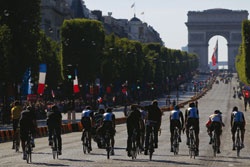
When coach Dave Brailsford set out to put together a world-class British cycling team three years ago, he knew he would need to find a top-notch corporate sponsor to support it. But it wasn’t just about logos and branding. According to agency Antidote, which worked with BSkyB and British Cycling on the marketing of the team, Brailsford wanted to create “the first brand in pro cycling”.
A brand would help get the best athletes onto the team, and Antidote helped Brailsford create “the line”, a manifesto that appears on the crossbar of all cyclists’ bikes, jerseys, laptop cases and on other collateral (see main picture, above). Together with the distinctive black outfits that riders wear, the blue line that also runs along their bikes helps the team stand out.
Team Sky was formed with the aim of getting Great Britain to win the Tour de France within five years - an ambitious goal given that this country had never won the race in its 109-year history.
It managed it in three, with Bradley Wiggins victorious at the Tour at the end of July, partly due to Brailsford’s training philosophy of “the aggregation of marginal gains”, meaning that even small improvements can make a big difference.
The injection of cash from Sky was clearly rather a larger gain. It reportedly spends about £10m a year on the sponsorship, including Wiggins’ reported £1.5m salary and the cost of buying him out of his contract with previous sponsor Garmin.
Wiggins wrote in The Guardian last month about how closely Sky supports the team. He said: “A week ago I rode the time trial of my life in the Tour, with James Murdoch in the car behind.
“After it all died down, the team went for a reception at The Ritz, again with James Murdoch and Jeremy Darroch, the head of Sky. There was champagne, quick speeches, with the riders all clearing the finger buffet because we were starving.”
BSkyB managing director of sales and marketing Stephen van Rooyen says the broadcaster’s attitude to creating Britain’s best cycling team is an example of the attitude that Sky has in general.
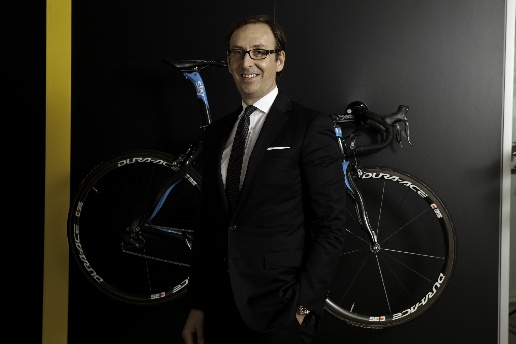
“What we have done with Team Sky is a microcosm of what we do at Sky. We focus on setting ourselves a challenge, finding the best people we can to help us achieve that, setting ourselves an incredible goal like winning the Tour de France in five years, then relentlessly pursuing it.”
He adds that this attitude is summed up by the internal mantra “believe in better”, which is used on its marketing too.
As to what will happen in the remaining two years of the contract Sky has with British Cycling, van Rooyen does not talk specifics, and doesn’t comment on whether this kind of sponsorship will extend to other sports.
“We will assess whether we have hit our objectives or not - they were many fold. We were trying to introduce more people to cycling, we set a target of 1 million more Brits on their bikes in five years, we set ourselves the goal of winning the Tour de France in five years. We are on track with that.
“We set an internal target to get our staff interested in something new and invaluable and also to help with the brand - we will have more to do. I think we have made a big difference, which is the most important part.”
Marketer 2 marketer
Simon Michaelides, marketing director, UKTV, asks: With the continued growth of video on demand, many industry observers would argue that the importance of strong channel brands is diminishing in favour of strong programme brands. What do you believe their relative role and value will be for broadcasters, in particular for Sky, given your focus on new, unmissable or exclusive content?
Stephen van Rooyen: In homes that have Sky+, more than 80 per cent of viewing is still live TV. So the end of live TV viewing and the growth of on-demand viewing is not something that has been carried out. I think the channel brands and really identifiable ones like Sky Atlantic are a great help to customers to find the type of programming that they associate with.
Programme brands are important, but I still think that when customers navigate their way around, they are going to look for some of the big channel brands that help them make decisions in terms of where to go.
In an on-demand world, the choice is overwhelming and the navigation therefore is under a lot of stress. A channel brand really helps you find the type of entertainment that you want.
My last 24 hours (23 July 2012)
This morning I had an impromptu meeting with [BSkyB chief executive] Jeremy Darroch and [group director of corporate communications] Graham McWilliam, who were both in Paris yesterday for the close of the Tour de France [won by Brit Bradley Wiggins, who rides for Team Sky].
We went through the papers to see what the coverage looked like, and went through some of the advertising that we put in to congratulate Team Sky and Bradley. We also had a debate about how much more we wanted to do.
I then had a meeting with my Republic of Ireland team talking to them about the exciting plans they’ve got for the next couple of months. We’ve already announced that we are recruiting another 100 people in Ireland. We are launching some new products there, so it was an update on how the programme for the launch is going and on their performance in the last week.
The investment we have been making in Ireland is tied into making sure that the business there becomes far more focused on the domestic market than it’s ever been. We have hired a new managing director, upscaled the sales and marketing group and the focus is now on how we make the Irish business more standalone and independent from what we do here in the UK.
I then had a group meeting to talk about the performance of Now TV so far and then the sales meeting, talking about the weekend’s performance, what was happening in the marketplace and whether the good weather has affected our sales rate or not.
CV
August 2011 to date Managing director, sales and marketing group, BSkyB
2009-2011 Joint deputy managing director, customer group, BSkyB
2006-2009 Director of product management and product marketing, BSkyB
2006-2009 Certificate of Professional Development in Management, The Wharton School, University of Pennsylvania
2004-2006 Director of strategy and planning, NTL Telewest/Virgin Media
2004 Strategy consultant, Nokia
1999-2003 Director of business development, News International
1995-1999 Consultant and manager, Accenture
1991-1994 Bachelor of commerce in management and strategy and LLB corporate and commercial law, Bond University, Australia









